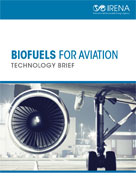Biofuels for aviation
 Developing and promoting biofuels for aviation will be essential to reduce carbon emissions from commercial aviation. As a first step, some pioneering airports have already incorporated bio-jet fuel into their refuelling systems. Yet wider bio-jet adoption is constrained by high costs compared to fossil-based jet fuels. New policy approaches are needed to set international standards and ensure co-ordination to incentivise bio-jet development. The aviation sector is one of the largest emitters of greenhouse gases in the world, at 2% of the human-induced total. The sector’s transition to sustainable, renewable fuels, therefore, is crucial to meet the international climate targets set forth in the 2015 Paris Agreement. This brief examines how the expansion of biofuels for jet aircraft can reduce emissions substantially compared to fossil-based jet fuel. Aviation in recent years has accounted for around 12% of global fuel consumption for transport. Many airlines, aircraft manufacturers and industry associations have set voluntary targets to achieve carbon-neutral growth by 2020 and halve emissions by 2050. Biofuels for Aviation is the first of several briefs from the International Renewable Energy Agency (IRENA) to focus on renewable-based transport.
Developing and promoting biofuels for aviation will be essential to reduce carbon emissions from commercial aviation. As a first step, some pioneering airports have already incorporated bio-jet fuel into their refuelling systems. Yet wider bio-jet adoption is constrained by high costs compared to fossil-based jet fuels. New policy approaches are needed to set international standards and ensure co-ordination to incentivise bio-jet development. The aviation sector is one of the largest emitters of greenhouse gases in the world, at 2% of the human-induced total. The sector’s transition to sustainable, renewable fuels, therefore, is crucial to meet the international climate targets set forth in the 2015 Paris Agreement. This brief examines how the expansion of biofuels for jet aircraft can reduce emissions substantially compared to fossil-based jet fuel. Aviation in recent years has accounted for around 12% of global fuel consumption for transport. Many airlines, aircraft manufacturers and industry associations have set voluntary targets to achieve carbon-neutral growth by 2020 and halve emissions by 2050. Biofuels for Aviation is the first of several briefs from the International Renewable Energy Agency (IRENA) to focus on renewable-based transport.
Related Content
- The role of e-fuels in decarbonising transport
- Renewables 2021: analysis and forecast to 2026
- Potential tankering under an EU sustainable aviation fuels mandate
- An assessment of the policy options for driving sustainable aviation fuels in the European Union
- Estimating sustainable aviation fuel feedstock availability to meet growing European Union demand
- Fueling flight: Assessing the sustainability implications of alternative aviation fuels
